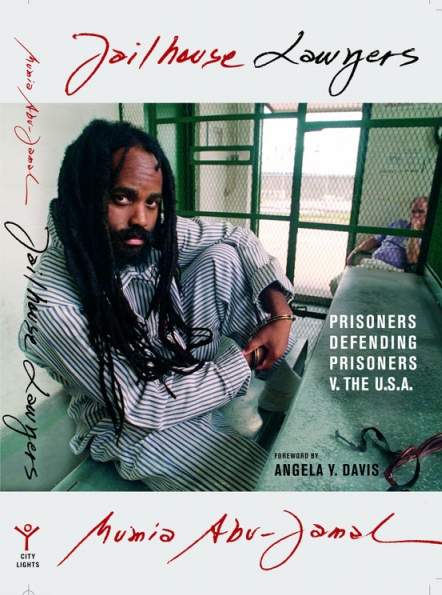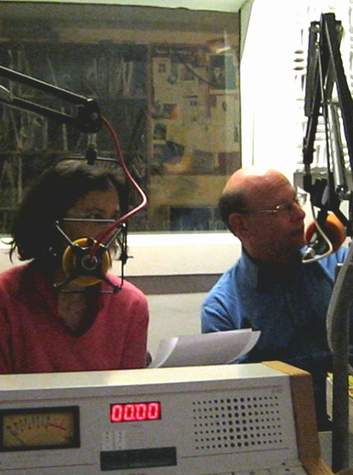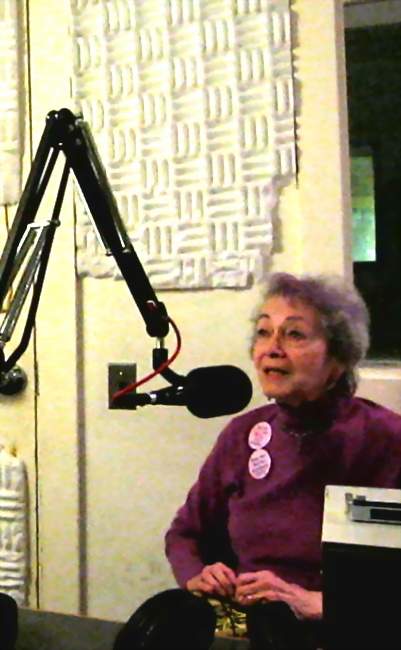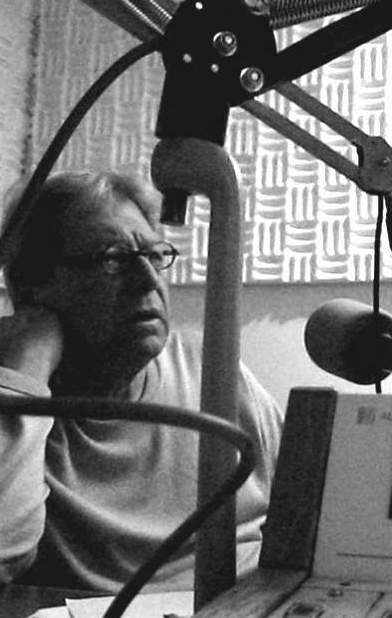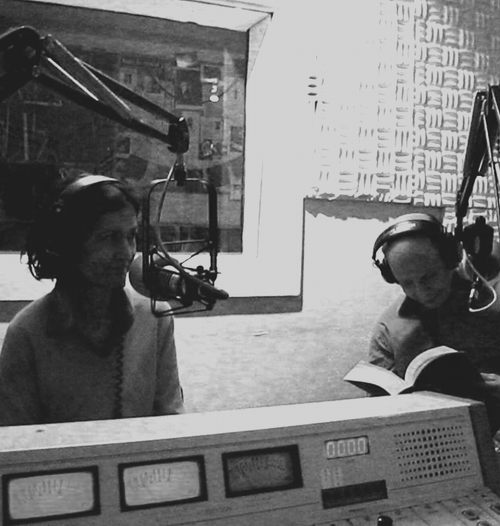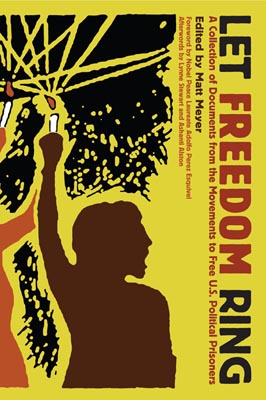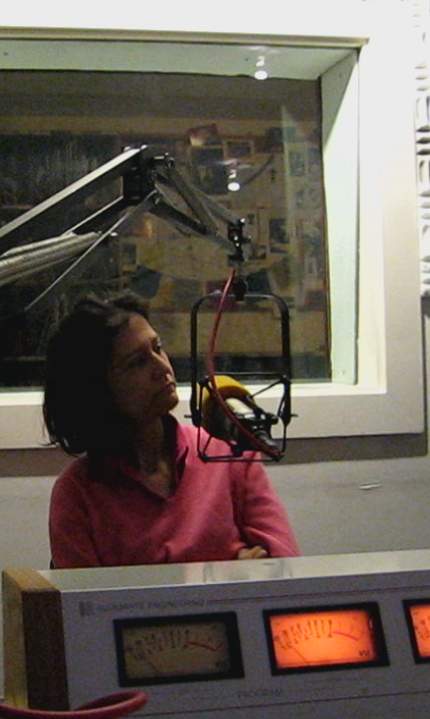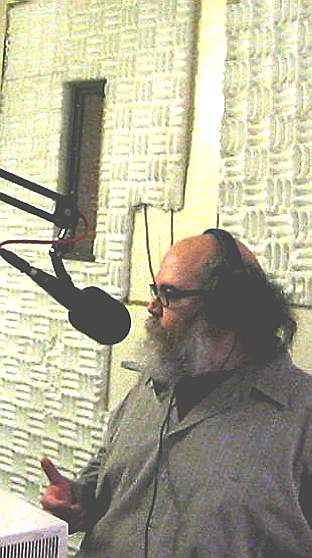Podcast: Play in new window | Download
Frances Golden: Jailhouse Lawyers, Prisoners Defending Prisoners Against the United States of America by Mumia Abu Jamal
Frances Golden joins us today to discuss a very well known political prisoner, as we continue our political prisoner series based on the book Let Freedom Ring. Frances is the literary agent for Mumia Abu Jamal. Mumia as many know, was convicted and sentenced to death for the 1981 murder of police officer Daniel Faulkner. Mumia was a Black Panther Party activist, cab driver, and journalist. Since his conviction, Mumia has become an international cultural icon for political prisoners. A previous guest here on Law and Disorder, author/ journalist J. Patrick O’Connor who wrote The Framing of Mumia Abu Jamal, says the real shooter was Kenneth Freeman a business partner of Mumia’s brother. Freeman, was found dead in 1985, bound and cuffed in a Philadelphia parking lot.
We get a another perspective today from Mumia’s literary agent Frances Golden. Frances also visits six death row in a Pittsburgh maximum security prison. Jailhouse Lawyers, Prisoners Defending Prisoners Against the United States of America by Mumia Abu Jamal.
Frances Golden:
- Visiting death row inmates happened because I went to visit Mumia as a visitor.
- I had to become a member of the Pennsylvania prison society. 40 bucks a year you can see any prisoner anywhere.
- Now, because the PPS applications were flooded to see Mumia, they changed the policy that only Pennsylvania residents can become members of PPS.
- You have to see more than one prisoner as a PPS member. So, Mumia gave me names of others including Robert Lark aka Sugar Bear.
- I hope I don’t cry when I say this, out of the 6 death row inmates I see, 5 of them are innocent.
- You’re behind very thick glass, there are quarter inch thick screens on each side of the cell where your voice can travel through. It’s awful, insulting but it’s what exists on death row.
- I have a little book with their names in it, with 100 pages(of notes) between each name.
- The prison system is illegal and inhuman. The person who speaks most clearly about that is Angela Davis.
- One prisoner nicknamed Slim was on the streets of Philadelphia without a home at 10 years old. Never went to school, got in trouble ended up on death row. He learned to read in prison, he’s a phenomenal jail house lawyer.
- Two of the five could get out, that’s Sugar Bear and Osiris.
- I have a prisoner friend whose name is Russel Shoates. He will never be executed but he’s on death row because he escaped 3 times. Russell is shackled and tied to his waist. I dance with them and do yoga. I can’t do that with Russell. I asked the warden to unshackle him. This man is gentle, he’s small, he’s wickedly intelligent.
- Philadelphia, the most corrupt city in the United States, from beginning to end. –Judges lock up kids for kickbacks in Pennsylvania
Guest: Frances Golden, activist and literary agent for Mumia Abu-Jamal, Frances is a member of the Pennsylvania Prison Society and visits 6 death row inmates monthly.
————
Laura Whitehorn and Susie Day – Let Freedom Ring, A Collection of Documents From the Movements to Free US Political Prisoners.
Among the many contributors to the book Let Freedom Ring is revolutionary ex-political prisoner and native New Yorker Laura Whitehorn. Since the 1960s Laura was active in supporting groups such as the Black Panther Party, the Black Liberation Movement and was active with Students for a Democratic Society and the Weather Underground. Laura also worked to expose the FBI’s Counter Intelligence Program. Laura was arrested in 1985, convicted of the 1983 US Capitol bombing and charged with… “conspiracy to oppose, protest and change the policies and practices of the United States government in domestic and international matters by violence and illegal means.” She was sentenced to 20 years in prison, and was released August 1999 after 14 years. Laura lives in New York City and is active in a wide range of progressive issues.
Laura’s partner Susie Day, activist, writer and contributer to Let Freedom Ring also joins Law and Disorder hosts in the studio.
- I’m in my sixties now, I was moved by the Black Liberation struggle and the struggle of the Vietnamese people against the United States.
- But I ended up spending years in prison later, in a case called the conspiracy case and our indictment was a thing of beauty – using the words violent and illegal means. It was a series of bombings of buildings. No one was ever hurt, great care was taken. One of the buildings was the U.S. Capitol.
- But in that period in 1988, we were in the DC jail for 3 years and it was the beginning of the huge epidemic of AIDS in Washington DC. It was a time of absolute fear, stigma, no drugs to treat HIV, and so we started to learn about HIV and did counseling, almost all the political prisoners had done that. This is because AIDS is huge in prison. A quarter of the people with AIDS in this country go through the prison system at some point.
- The fact that the government says there are no political prisoners, it’s a denigration of everything that you stand for. So, it was important that we had a lot of support.
- There’s a great interest in the sixties movements, the movies and books etc, but that doesn’t translate into the willingness to say enough is enough. People have been in jail since the late sixties and early seventies. How much time do you have to serve in this country, what kind of country do we have?
- In Europe the maxium is 20 years, sometimes they go farther. That’s a life sentence in Europe, but here, you could have saved the warden’s life but if you were a black panther and go to the parole board, they say you can’t get out.
- We have Obama, but the same justice system. We have to fight for a new justice system. What happens to political prisoners will happen to everyone else. We were held in preventive detention now everyone knows what it is.
- The book is a guide in how to raise these cases, who these people are, what kinds of organizations are out there. What can people do? The Jericho Movement
Susie Day:
- Before I met Laura Whitehorn, I was sort of intrigued by all the compromises most of us make everyday, for decades. We cut corners everyday to go to our jobs, to raise kids, to pay the rent, and we support involuntarily things that we abhor. So, I was interested in people who did not compromise. Who lived underground, who would go to extremes of giving up their lives of basic middle class educated comfort. . .and give up their identities to fight an establishment that made it so easy for everyone else to just get along.
Guest: Laura Whitehorn – revolutionary ex-political prisoner and native New Yorker Laura Whitehorn. Since the 1960s Laura was active in supporting groups such as the Black Panther Party, the Black Liberation Movement and was active with Students for a Democratic Society and the Weather Underground. Laura also worked to expose the FBI’s Counter Intelligence.
Guest: Susie Day lives in New York City where she writes a humor column for feminist and gay publications. She has also written on U.S. political prisoners and labor issues and thinks her girlfriend, Laura Whitehorn, is hot stuff. Can’t get enough of Susie? Read other pieces by Susie Day in MRZine: Susie Day, “Fugitive Offers Reward for Rumsfeld’s Capture” (22 July 2005); “Street Life of a Mad Activist” (28 July 2005);
—
Matt Meyer – Let Freedom Ring, A Collection of Documents From the Movements to Free US Political Prisoners.
New York based educator and activist Matt Meyer. Matt is the editor of several books including the recently published Let Freedom Ring, A Collection of Documents From the Movements to Free US Political Prisoners. – The book nicely pulls together two decades of essays, interviews and resolutions of US political prisoners. These are the voices and intimate writings of those who have challenged the US empire from within, Black Panthers, Puerto Rican independentistas, white anti-imperialists, environmental and animal rights militants and Arab and Muslim activists. Meyer is a former public draft registration resister and chair of the War Resisters League.
Matt Meyer:
- We wanted to bring awareness to that yes, there are political prisoners in the US.
- There’s been a history to support those movements and free them.
- This book focuses on the last 25 years as a key era that took us through the late sixties and seventies of social change.
- The majority of peoples that have been in prison come from the black civil rights liberation movement, come from the American Indian Movement, come from the Puerto Rican and Chicano movements and come from some white allies and supporters.
- Political prisoners are in jail because of the ideas they’ve had as much as the acts they’ve committed. They’re political actions and beliefs and who are in jail 20, 30 years, incredibly long sentences and harsh conditions.
- It is also a collection of documents from the movement to free them. For example from the Puerto Rican movement. We have a collection of documents that began to help free 12 Puerto Rican political prisoners – this shows how this came through by a combination of grassroots support and international pressure.
- This book says to activists and all readers that we can build upon the strategies that have been used in the last 20 years. We can look at some of the documents and get a sense of how to use these strategies today to help not only political prisoners but prisoners in the ever increasing US prison system. There is a growing sense that we should all pay more attention to these folks who are languishing in jail.
- The fact that the information in this book was not readily available, it was scattered here and there. This volume was designed as a tool with the hope to spark new movements.
- What can people do? The Jericho Movement
Guest: Matt Meyer – Founding PJSA Co-Chair along with USF Dean Jennifer Turpin, Meyer has long worked to bring together academics and activists for lasting social change. A former public draft registration resister and chair of the War Resisters League, he continues to serve as convener of the War Resisters International Africa Working Group. With Bill Sutherland, Meyer authored Guns and Gandhi in Africa: Pan-African Insights on Nonviolence, Armed Struggle and Liberation, of which Archbishop Desmond Tutu wrote, “Sutherland and Meyer have looked beyond the short-term strategies and tactics which too often divide progressive people.
—————————————
